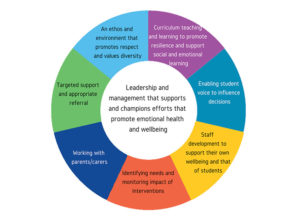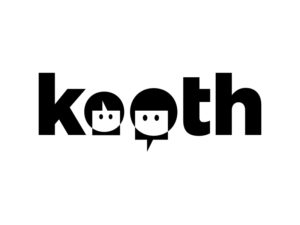HeadStart Kent 2019/20 year-end report: System change in school and community approaches to young people’s mental health
There is evidence that over the past year HeadStart Kent (HSK) has taken strategic steps in facilitating system change in school and community approaches to young people’s mental health.
This has been demonstrated by HSK providing tools, training and resources to develop the workforce who support young people and by ensuring plans are in place, so coproduction is embedded and championed throughout the system.
Building collaborative relationships and both competently and efficiently delivering the programme has enabled the change to be realised. Local and countywide sustainability planning and the sharing of evidence around ‘what works’ has ensured successful elements of the programme have future funding or are owned within the system.
HSK operates at three levels: Kent-wide, Universal Plus and Additional. Each level comprises of specific activities and interacts with the other levels to create whole system change and long-term sustainability to improve the emotional wellbeing and resilience of children and young people in Kent.
The programme is also underpinned by four evidence-based approaches;
- Promoting the Public Health Whole-school Approach on emotional wellbeing and mental health;
- Introducing the Resilience Domains Model as a way of mapping young people’s resilience and establishing where they can be supported;
- Utilising the Kent Resilience Framework as a tool to empower schools and communities to make resilient moves, and assess how effectively the school or service promotes resilience and emotional wellbeing and the measures required to improve it;
- Coproduction with young people, parents, families and the community to ensure their voice is always listened to.
To evaluate the extent to which HSK has contributed to system change up to March 2020, information has been collated from a range of sources. This includes interviews with the HSK programme leads, monthly and annual programme reporting against deliverables, data and reports from delivery partners and the work carried out by Young Evaluators. Staff self-efficacy has been measured through the annual survey of HSK school staff.
In addition, evidence has been drawn from the Whole School Approach and Participation and Coproduction internal evaluations which were carried out earlier in the year and the HeadStart National Learning Team’s policy briefing around the approach to systems change and sustainability across the partnerships.
Organisational and individual change
Change can be achieved by providing the training and tools to organisations and individuals to ensure there is a shift to a shared language and approach to young people’s emotional wellbeing and mental health. This has been demonstrated through the use of the Resilience Toolkit and by staff putting learning into practice in schools and communities.
Tools and awards – The HSK schools continue to use the Resilience Toolkit as a resource to create a comprehensive plan of activity to embed a whole school approach. 27 schools have achieved the standard to receive the Award for Resilience and Emotional Wellbeing.
The Kent Community Health Foundation Trust (KCHFT) is promoting the Toolkit to non-HSK schools and supporting them through training. The community toolkit has been streamlined and is being tested by organisations in different community settings before its release.
 Whole school approach – A qualitative evaluation of four HSK schools who received the Award for Resilience and Emotional Wellbeing showed that both staff and students thought it was important that careful consideration was needed around the use of language and how situations are approached. They also believed having a variety of staff available to support students and to be champions at promoting resilience and wellbeing throughout the school was essential.
Whole school approach – A qualitative evaluation of four HSK schools who received the Award for Resilience and Emotional Wellbeing showed that both staff and students thought it was important that careful consideration was needed around the use of language and how situations are approached. They also believed having a variety of staff available to support students and to be champions at promoting resilience and wellbeing throughout the school was essential.
Training – The training delivered by the HSK delivery partners around resilience, mindfulness and mental health first aid showed that a majority of those completing their post course evaluation reported they were confident using the knowledge learnt during the training.
The reach of the training is wide, with nearly a third of those trained sitting in community roles outside of school settings. The Young Evaluators at one school wanted to capture evidence around student’s views on the wellbeing support in their school. Just over half felt that they had an adult who they could speak to about wellbeing at school.
 Staff self-efficacy – The staff in HSK schools who responded to the staff self-efficacy survey mostly responded positively to the 10 statements. Compared to last year, there was an improvement across all statements, except for one. Staff felt most confident that they could positively influence their student’s personal and academic development. Being successfully able to teach difficult students showed the most improvement compared to last year.
Staff self-efficacy – The staff in HSK schools who responded to the staff self-efficacy survey mostly responded positively to the 10 statements. Compared to last year, there was an improvement across all statements, except for one. Staff felt most confident that they could positively influence their student’s personal and academic development. Being successfully able to teach difficult students showed the most improvement compared to last year.
Online presence and key communications
It is important to promote the agenda around improving resilience and emotional wellbeing and to have resources available that are both accessible and suitable for those that may need them. This has been demonstrated through the development of the new websites and continued sharing of key messages by HSK.
Websites – The new Resilience Hub was launched and includes new content, tools and resources available for organisations, staff and parents/carers. Moodspark, the website designed specifically for young people, was also launched. The websites were advocated by the Corporate Director for Children, Young People and Education (CYPE). It is planned that KCHFT will take over ownership and responsibility for the site when HSK ends.
 Social marketing – The social marketing campaign, ‘Draw your own solution’ delivered by Hitch Marketing, started in March and ran for around 4 weeks. The campaign featured on media platforms such as Facebook, Snapchat, Instagram, the Resilience Hub and Moodspark websites and also on Radio Kent.
Social marketing – The social marketing campaign, ‘Draw your own solution’ delivered by Hitch Marketing, started in March and ran for around 4 weeks. The campaign featured on media platforms such as Facebook, Snapchat, Instagram, the Resilience Hub and Moodspark websites and also on Radio Kent.
Findings from a survey carried out with young people during the campaign showed that those who stated they knew what resilience meant also rated themselves significantly more resilient than those who did not know what resilience was. A recommendation was noted in the report to increase awareness of resilience among young people as this could potentially have a positive influence on their resilience.
Key messages – Communications relating to improving resilience and emotional wellbeing were continually shared on social media platforms and websites. These were often linked to nationwide campaigns such as Mental Health Week and Every Mind Matters. Promotion of HSK successes, such as schools receiving their Award for Resilience and Emotional Wellbeing and young people achieving personal awards, were also celebrated and shared widely.
Sustaining ‘what works’
To ensure positive outcomes for young people continue to be achieved beyond the end of the programme, future funding needs to be secured, programme elements need to be embedded within existing systems, robust evidence of what works should be provided and there should be clear ownership of deliverables. This has been demonstrated by HSK through the sharing of local evaluation findings, funding provided from partners and comprehensive forward planning of sustainability both locally and countywide.
Sharing learning – Local evaluation findings were shared with colleagues in the children and young people’s sector, such as The Children’s Society and Early Intervention Foundation, at an event in December. HSK is a key partner working alongside Clinical Commissioning Group (CCG) colleagues. At an event facilitated by the National Children’s Bureau (NCB), evidence was provided from the programme’s learning to inform and influence the Local Transformation and Long-Term Plan.
 Future funding – After reviewing the positive impact of the online support and counselling provided by Kooth, the CCGs across Kent agreed to fund an extension of the contract in all 9 HSK districts until March 2021. It was also agreed that the support would expand to cover the 3 non-HSK districts. At the end of the contract, outcomes will be reviewed, and the CCGs will potentially fund Kooth in future years.
Future funding – After reviewing the positive impact of the online support and counselling provided by Kooth, the CCGs across Kent agreed to fund an extension of the contract in all 9 HSK districts until March 2021. It was also agreed that the support would expand to cover the 3 non-HSK districts. At the end of the contract, outcomes will be reviewed, and the CCGs will potentially fund Kooth in future years.
After sharing the evidence of the Talents & Interests grant successes and working with the charity Involve Kent, they have been awarded resources to employ link workers from the Primary Care Network in rural Maidstone which will focus on social prescribing for young people.
Embedding within the system – Sustainability planning took place locally across 5 districts. Key representatives discussed what they considered to be worthwhile continuing after HSK has left. The countywide sustainability strategy was re-written to incorporate the Key Lines of Enquiry (KLOE) provided by the NCB.
The KLOE was designed to aid the HeadStart partnerships to reflect on their progress in relation to sustainability planning beyond the end of the programme. The actions within the plan continue to be delivered. The internal Integrated Children’s Services action plan has been agreed and action owners are due to be allocated. A joint countywide sustainability workshop with key strategic partners will take place in 2020/21.
Coproduction
Providing young people with the opportunity to lead empowers them and improves their confidence, which better equips them for adult life. Increasing the emphasis on coproduction in policy and decision making ensures that intervention design and delivery meets the needs of young people. This has been demonstrated by the steps HSK have taken to ensure coproduction is embedded and championed throughout the system.
Coproduction training – Young people from HSK, the Children in Care Council, the Young Adult Council and the Kent Youth County Council (KYCC) designed and delivered coproduction training to 211 adults over 10 sessions. The range of adults trained was broad; KCC senior leads, school staff, commissioners, KCHFT and many more. The training is viewed as a success and has helped staff to think about how they can positively engage the young people they work with through coproduction to provide better outcomes.
Many staff have made pledges to ensure they put what they have learnt into practice. Work is continuing to train staff across the districts before the end of the programme, so knowledge around coproduction is fully
embedded and can be sustained.
Young people’s influence – Young people, and their families, have had the opportunity to be heard and influence services and systems through a number of events. Young people have been involved in verifying the HSK delivery partners through the You’re Welcome Standard, with a wider rollout planned for health contracts.
Following a successful event in October, HSK continues to support the Canterbury Autism Pilot, working alongside Canterbury and Coastal CCG and North East London Foundation Trust (NELFT). The Hear Me Now group in Thanet has young people from HSK SpeakOut embedded into the group.
Youth Charter – Working alongside the young people in HSK, KYCC and Virtual School Kent Children in Care Council, a draft Youth Charter has been developed. HSK has led on this piece of work, which will be finalised through official channels in 2020/21.
Partnership working and influence
Building collaborative relationships and influencing partners within the system contributes to achieving the ambition that change can be realised. This has been demonstrated by HSK competently delivering the programme which has given partners confidence, they have seized opportunities and know key people within the system.
Relationships with partners – Working with partner agencies, such as the Police, the Police and Crime Commissioner, Probation, Health and district councils, the Kent and Medway Domestic Abuse Strategy was agreed. Learning from HSK around working with schools was drawn upon to inform the strategy.
The action plan that underpins the strategy is a live document that is continually updated by partners, which influences cross-agency commissioning. Colleagues within CYPE Management Information were provided with the HSK evaluation framework as a basis to inform their work around the outcomes of the Serious Youth Violence Strategy.
HSK model – Based on the learning from HSK, elements of the programme have been incorporated into additional projects which aim to support young people, such as the Kent Violence Reduction Unit in three non-HSK schools and the KCC gangs project.
Project support – HSK have project managed the rollout of Mental Health Support Teams (MHST) in Maidstone and Canterbury. This includes supporting 35 schools by delivering workshops around the whole school approach and leading steering groups with partners.
As HSK is regarded by partners in the health system as a programme that has been effectively delivered through competent project management, this influenced the decision to have HSK in a leading role in the rollout of MHSTs.
Sarah Collins – Sarah.Collins@kent.gov.uk
HeadStart Monitoring and Evaluation Officer
Strategic Commissioning – Analytics
July 2020
HeadStart Kent 2019/20 year-end report: System change in school and community approaches to young people’s mental health
-
HSK 201920 Year End Report Systems Change FINAL...NAL
.pdf
651.08 KB
Download resource